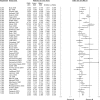Systematic review and meta-analysis of the efficacy of appropriate empiric antibiotic therapy for sepsis
- PMID: 20733044
- PMCID: PMC2976147
- DOI: 10.1128/AAC.00627-10
Systematic review and meta-analysis of the efficacy of appropriate empiric antibiotic therapy for sepsis
Abstract
Quantifying the benefit of early antibiotic treatment is crucial for decision making and can be assessed only in observational studies. We performed a systematic review of prospective studies reporting the effect of appropriate empirical antibiotic treatment on all-cause mortality among adult inpatients with sepsis. Two reviewers independently extracted data. Risk of bias was assessed using the Newcastle-Ottawa score. We calculated unadjusted odds ratios (ORs) with 95% confidence intervals for each study and extracted adjusted ORs, with variance, methods, and covariates being used for adjustment. ORs were pooled using random-effects meta-analysis. We examined the effects of methodological and clinical confounders on results through subgroup analysis or mixed-effect meta-regression. Seventy studies were included, of which 48 provided an adjusted OR for inappropriate empirical antibiotic treatment. Inappropriate empirical antibiotic treatment was associated with significantly higher mortality in the unadjusted and adjusted comparisons, with considerable heterogeneity occurring in both analyses (I(2) > 70%). Study design, time of mortality assessment, the reporting methods of the multivariable models, and the covariates used for adjustment were significantly associated with effect size. Septic shock was the only clinical variable significantly affecting results (it was associated with higher ORs). Studies adjusting for background conditions and sepsis severity reported a pooled adjusted OR of 1.60 (95% confidence interval = 1.37 to 1.86; 26 studies; number needed to treat to prevent one fatal outcome, 10 patients [95% confidence interval = 8 to 15]; I(2) = 46.3%) given 34% mortality with inappropriate empirical treatment. Appropriate empirical antibiotic treatment is associated with a significant reduction in all-cause mortality. However, the methods used in the observational studies significantly affect the effect size reported. Methods of observational studies assessing the effects of antibiotic treatment should be improved and standardized.
Figures



References
-
- Al-Reesi, A., N. Al-Zadjali, J. Perry, D. Fergusson, M. Al-Shamsi, M. Al-Thagafi, and I. Stiell. 2008. Do beta-blockers reduce short-term mortality following acute myocardial infarction? A systematic review and meta-analysis. CJEM 10:215-223. - PubMed
-
- Alvarez-Lerma, F. 1996. Modification of empiric antibiotic treatment in patients with pneumonia acquired in the intensive care unit. ICU-Acquired Pneumonia Study Group. Intensive Care Med. 22:387-394. - PubMed
-
- Andreu Ballester, J. C., F. Ballester, A. Gonzalez Sanchez, A. Almela Quilis, E. Colomer Rubio, and C. Penarroja Otero. 2008. Epidemiology of sepsis in the Valencian Community (Spain), 1995-2004. Infect. Control Hosp. Epidemiol. 29:630-634. - PubMed
-
- Behrendt, G., S. Schneider, H. R. Brodt, G. Just-Nubling, and P. M. Shah. 1999. Influence of antimicrobial treatment on mortality in septicemia. J. Chemother. 11:179-186. - PubMed
Publication types
MeSH terms
Substances
LinkOut - more resources
Full Text Sources
Other Literature Sources
Medical

